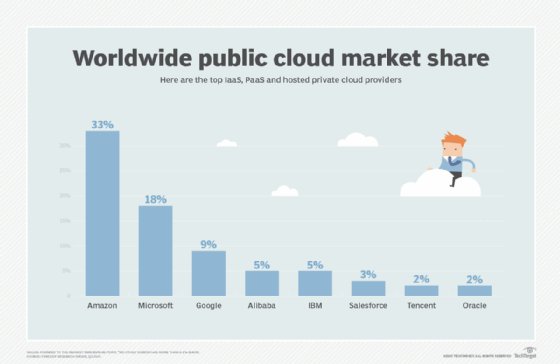
Luiz - Fotolia
An introduction to Alibaba cloud offerings
Learn about the fourth largest public cloud provider with this look at some of Alibaba's core computing, networking, storage and database offerings.
When choosing between cloud providers, most U.S.-based enterprises and cloud developers primarily lean toward AWS, Microsoft Azure and Google Cloud. While the Big Three providers dominate the cloud market, the fourth largest -- China-based Alibaba Cloud -- is also worth noting for its breadth of cloud services and expanding global availability.
Similar to the emergence of AWS from Amazon, Alibaba Cloud is a product of the Alibaba Group, a Chinese e-commerce giant.
Alibaba Cloud currently operates in 21 data center regions and 63 global availability zones. It is primarily focused on areas in mainland China and other Asia-Pacific regions, but there are also two regions in the U.S. and two in the European Union.
In terms of its place in the public cloud market, Alibaba Cloud is the biggest public cloud in China, and it's still growing rapidly, said Rachel Liu, senior research manager at IDC China's Enterprise Research Group. Alibaba's cloud revenue grew 59% year-over-year in the second quarter of 2020, according to its latest quarterly report.
Along with the other top providers, Alibaba Cloud offers various cloud infrastructure and application development services. Alibaba follows the standard usage-based, pay-as-you-go pricing model that the majority of providers have adopted.
"In terms of the product type and quantity, I think Alibaba has caught up with the top three cloud providers, which can provide over 200 products in the China market," Liu said. "Alibaba has a rich infrastructure portfolio, which includes computing, network, storage, security and hybrid cloud solutions."
Get to know some of the provider's services with this introduction to Alibaba cloud offerings for compute, storage, database and networking.

Compute
Elastic Compute Service (ECS). This is the platform's core IaaS offering for scalable compute capacity. Developers use ECS to deploy virtual servers -- called instances -- within their Alibaba cloud environments. ECS instances deliver the computing requirements -- such as CPU, memory and network bandwidth -- necessary to run and manage applications. IT teams can choose from various ECS instance types and change them depending on workload needs.
ECS Bare Metal Instance. This Alibaba computing service combines the features of VMs and physical machines. ECS Bare Metal Instance provides the elasticity and scalability of VMs with the performance and isolation of physical servers. This service supports standard ECS instances and nested virtualization. ECS Bare Metal Instance is a good fit for an application that requires non-virtualized environments and strong resource isolation.
Container Service for Kubernetes (ACK). Alibaba's container management service provides a runtime-environment for Kubernetes-based container applications. Developers create and deploy Kubernetes clusters in ACK, which integrates with Alibaba Cloud services for virtualization, storage and security. In addition to ACK, Alibaba's other container offerings are Container Registry, a platform for containerized image hosting, and Elastic Container Instance, for serverless container instances.
Function Compute. IT teams use this serverless platform so they can focus on code development instead of server management. This event-driven computing service supports synchronous and asynchronous calls to trigger functions. Users can select pay-as-you-go or lower-cost subscription pricing, or use a combination of both. Function Compute has notable service limitations -- i.e., no more than 50 functions can be created under a single service and no more than 10 triggers can be created under a single function.
Storage
Object Storage Service (OSS). This service stores high volumes of data in the cloud. Enterprises can store any type of unstructured data in OSS, such as image, audio and video files for applications and websites. OSS hosted data is encrypted and highly available. Objects are stored in buckets, which administrators can configure to meet requirements based on region, access controls and storage class. Alibaba offers four OSS storage classes: Standard, Infrequent Access (IA), Archive and Cold Archive. The Standard class is highly available and reliable for frequent data access. IA, Archive and Cold Archive are lower cost storage tiers for data that requires less frequent access.
Apsara File Storage NAS. This service provides network attached file storage (NAS) for ECS instances, Elastic High-Performance Computing instances and Container Service for Kubernetes nodes. File Storage NAS provides a distributed file system with maximum capacity of up to 10 PB that automatically scales when files are added or removed. This service encrypts data at rest -- as well as in transit -- and offers shared access, high throughput, data replication and backup. Users can access data from this NAS storage service via standard file access protocols.
Elastic Block Storage. Alibaba provides block storage devices for ECS instances with this service. Elastic Block Storage offers cloud block storage disks based on Alibaba cloud architecture and local disks. Local block storage disks are physical devices attached to physical machines that host ECS instances. Elastic Block Storage devices feature low-latency storage, random read-write capabilities and data persistence.
Database
ApsaraDB for PolarDB. This relational database service is compatible with MySQL, PostgreSQL and Oracle syntaxes. PolarDB has 100 TB maximum storage capacity. PolarDB decouples compute and storage resources. This relational database features low-latency physical replication, data backup and disaster recovery. Alibaba also offers PolarDB stacks, a database appliance designed for on-premises database management.
ApsaraDB for MongoDB. This NoSQL database is based on the open source MongoDB protocol. ApsaraDB for MongoDB is a document database that features automatic monitoring and scalability. Architecture configurations for this database service include standalone instances, replica set instances and sharded cluster instances.
LedgerDB. The platform's ledger database offers data auditing capabilities and uses blockchain database technology. This database service is useful for keeping data records and executing data tracing tasks. LedgerDB can perform 300,000 transactions per second on a single ledger for a single client.
Networking
Virtual Private Cloud (VPC). IT teams create a private, isolated network dedicated to their cloud accounts with this VPC service. Developers can customize their VPCs to meet their cloud network requirements by defining the IP address range, route tables and network gateways. VPCs can connect to other VPCs or on-premises data centers.
Server Load Balancer. Alibaba's Server Load Balancer distributes inbound traffic across multiple ECS instances. The service virtualizes these ECS instances into back-end servers using virtual IP addresses, which helps avoid the risks of a single point of failure and improves availability. This service enables fast response times to traffic spikes.
Alibaba Cloud DNS. This domain name system (DNS) service translates domain names into machine-readable IP addresses. Alibaba Cloud DNS routes user queries to websites and application servers. It can handle millions of DNS queries per second and comes with security features to protect against DNS attacks.
Alibaba Cloud PrivateZone. This service provides a private domain name management system based on specified VPCs. IT teams use PrivateZone to resolve IP addresses and manage resources. With this service, the domain names cannot be accessed over the internet or any other resource besides the specified VPCs.








